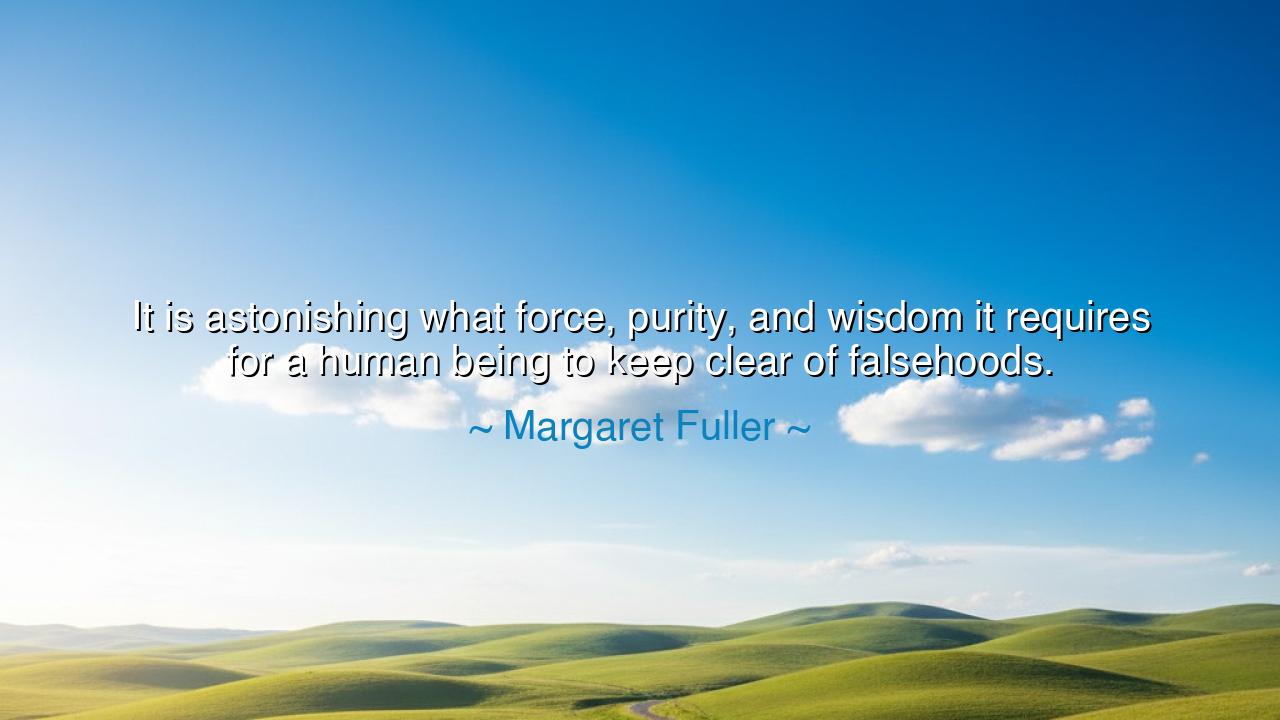
It is astonishing what force, purity, and wisdom it requires for
It is astonishing what force, purity, and wisdom it requires for a human being to keep clear of falsehoods.






Hearken, O children of discernment, to the luminous words of Margaret Fuller, who unveils the arduous path of truth. She declares that it is astonishing what force, purity, and wisdom are required for a mortal to remain clear of falsehoods. Herein lies a lesson for all generations: the pursuit of truth is no gentle endeavor, but a constant struggle, demanding vigilance of mind, courage of heart, and integrity of soul.
The origin of this reflection is rooted in Fuller’s life as a scholar, critic, and champion of human understanding in the early nineteenth century. She observed that men and women are surrounded by illusions, prejudices, and deceptions, both within society and within themselves. To navigate this labyrinth of falsehoods, one must cultivate not only intellectual force, but moral purity and practical wisdom, for the mind alone cannot withstand the seductions of error and deceit.
The meaning of this aphorism is profound: truth is not merely discovered, it is defended. To remain untainted by falsehoods requires discernment, patience, and courage, for the world offers distractions, seductions, and subtle deceptions at every turn. Fuller reminds us that integrity of thought and clarity of judgment are achieved through steadfast vigilance and the continual cultivation of moral and intellectual strength.
History provides living testimony to this teaching. Consider Socrates, who, amidst the seductions of sophistry and the corruptions of Athenian politics, pursued truth with unwavering resolve. His life, ending in martyrdom, exemplifies the extraordinary force, purity, and wisdom necessary to remain clear of falsehoods, illuminating for all time the price and power of intellectual and moral integrity.
Moreover, this teaching extends to all who seek enlightenment. The scholar who questions assumptions, the judge who seeks impartial justice, the seeker who examines beliefs without bias—all enact Fuller’s counsel. To cultivate discernment is to resist the myriad falsehoods that assail the mind, to anchor the soul in truth, and to act with clarity and moral courage in every circumstance.
O generations yet unborn, take this counsel into your hearts: recognize the labor and vigilance required to remain clear of falsehoods, and nurture within yourselves the force, purity, and wisdom demanded by truth. For in this pursuit lies the power to discern rightly, to act justly, and to live a life illumined by clarity, integrity, and enduring understanding.






TDpham hoang tuan du
This quote makes me reflect on the courage it takes to maintain honesty and clarity in life. Does resisting falsehood require continuous vigilance and self-discipline? I’m curious about the balance between discernment and trust—how do we avoid both deception and excessive skepticism? Fuller’s insight also invites consideration of the emotional and intellectual effort involved in perceiving reality accurately, especially in contexts where misinformation is subtle and pervasive.
TLNg Thao Ly
Reading this evokes thoughts about the complexity of human perception. How much of what we accept as truth is influenced by bias, desire, or social pressure? Fuller seems to suggest that clarity requires effort and ethical grounding, not just knowledge. I also question whether some forms of falsehood are benign or even necessary, and how we navigate the tension between practical compromise and the pursuit of absolute truth.
TMNguyen tra my
This statement raises questions about the relationship between wisdom and discernment. If avoiding falsehoods demands such strength and virtue, does this mean society as a whole is prone to self-deception? I also wonder about the role of critical thinking and education in strengthening this resistance. Are there systematic ways to cultivate force, purity, and wisdom in individuals, or is this struggle inherently personal and idiosyncratic?
TTNguyen Thi Thu Thuy
I find this perspective profound because it emphasizes the human struggle for truth. Does the necessity of 'force, purity, and wisdom' suggest that most people naturally succumb to falsehoods? It also prompts reflection on modern contexts, like media, politics, and social interactions—are we constantly challenged to separate truth from illusion? I’m curious whether Fuller’s view implies that truthfulness is a lifelong practice rather than a simple state to achieve.
DNdao nguyen
Reading this, I’m struck by the ethical dimension Fuller implies. Avoiding falsehoods isn’t just about intelligence, but also moral strength and integrity. How much does culture, upbringing, or environment influence our susceptibility to deception? I also question whether complete avoidance of falsehood is achievable, or if it’s more about striving for honesty and discernment. This makes me consider the personal effort required to live authentically and truthfully.